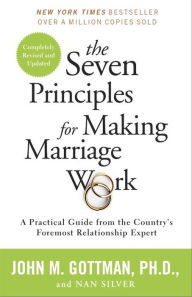There are a lot of books out there to help any marriage that might be in trouble, excellent books that describe how we form attachments, how we love and different love languages we use with our mates.
However, I am particularly biased toward Gottman’s books because of his extensive work with clients and research study on the habits of marriage couples through The Gottman Institute.
While he has written a number of books, two of my favorites are “Couples Communication” and “The Seven Principles for Making Marriage Work”
Each chapter describes one of the principles and includes many user friendly exercises for better understanding and application to your own marriage. Here is his blueprint to make your marriage long-lasting.
The seven important principles according to Gottman
1. Enhance your Love Maps
Become intimately familiar with your mate. Know each other’s goals, worries, hopes, likes and dislikes. Develop a “love map” of your spouse, know what pleases him or her. Then make time for each other – make it a top priority every day. This isn’t a chore – this is a joyful event of becoming more known to your spouse and understood as you do them.
2. Nurture Your Fondness and Admiration
Gottman believes fondness and admiration are two of the most crucial elements you can have in a rewarding and longlasting romance. While problems, personalities, etc. may create friction at times, if partners continue to treat each other with honor and respect they won’t be a problem. Remind each other of their positive qualities. Fondness and admiration are antidotes for contempt.
3. Turn Toward Each Other Instead of Away
It is staying connected that is important. And that is always a choice. You choose to turn towards or away from each other. When turning towards the other you are creating an emotional bank account that will be a cushion when times get tough.
4. Let your Partner Influence You
Respect and honor each other’s opinions and feelings and make your spouse a partner in all decision making. Ask for and respect the input and influence of the other. This can be more difficult for a man, but when he is NOT willing to share power there is an 81% chance the marriage will self-destruct.
5. Solve Your Solvable Problems
Gottman believes there are two basic kinds of marital conflicts: those that are solvable and those that are perpetual. 69% of problems fall into the perpetual problem category, those problems that cannot be resolved. So what do you do? You learn to live with them and approach them with good humor. Both acknowledge it is a problem, but they accept each other and their differences with love. The relationship is more important than the difference. Solvable problems are less painful or intense and are the subject of a particular situation that may involve underlying issues of trust, security and selfishness. They may include problems with in-laws, finances, sex, household chores, parenting, etc.
6. Overcome Gridlock
When we are in a gridlock, our dreams and aspirations and wishes that are part of your identity and which give purpose and meaning to your life has come to a standstill. To end gridlocks requires dialogue, understanding the cause of the gridlock, respecting the dreams and desires of your mate, honoring the requests of the other. Within any relationship we need to feel we have the freedom to be ourselves as individuals and just as we explore who we are as individuals we explore who we are within our relationship.
7. Create Shared Meaning
Marriage is how you share your life beyond the chores, parenting and raising children, or making love. It’s about creating meaning together. It’s creating an atmosphere where each person can talk honestly about his/her conviction. It involves creating both family and couple rituals that are satisfying to both.
Marlene Anderson
Receive a Free Consultation: Fill out the contact form to receive a free consultation about Personal Life Coaching, speaking engagements, retreats or teaching workshops for your church or women’s groups on relationships or other topics that affect our lives.
Sign up today to receive the entire series: http://eepurl.com/baaiQ1



















